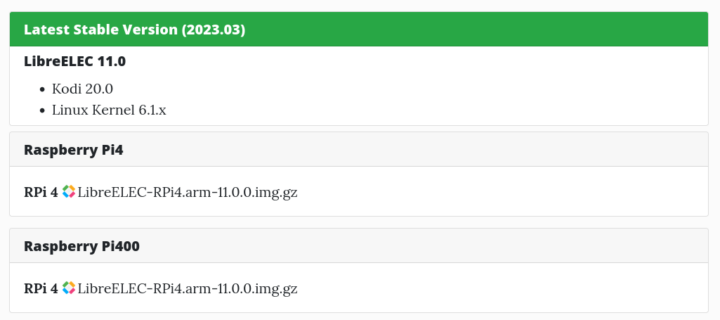LibreELEC 11 lightweight media center Linux distribution based on Kodi 20 “Nexus” has just been released with various improvements on x86 and Arm platforms.
Kodi 20 was released and available for download in January with AV1 hardware video decoding in Android and x86 (VAAPI) platforms with AV1-capable GPU or VPU, FFMPEG 4.4, Pipewire support in Linux, and a few others. LibreELEC 11 enables you to have a dedicated, and fast booting, HTPC based on a mini PC, a Raspberry Pi SBC, or an Arm-based TV box with all features from the latest Kodi release.
LibreELEC 11 supports Raspberry Pi 2 to 4 SBCs, 64-bit x86 hardware, various Allwinner, Rockchip, and Amlogic SBCs and TV boxes with x86, Raspberry Pi, and Rockchip hardware considered more stable and feature complete.
LibreELEC 10.0 did away with Amlogic TV boxes and single board computers because of driver issues, but LibreELEC 11.0 brings Amlogic back but only the older Amlogic S905, S905X/D and S912 systems but hardware based on the new S905X2/D2/Y2, S905X3, S922X, A311D processors are not formally supported because of driver issues meaning 10-bit decoding and 4K video are not working. The old platforms are not perfectly supported either with H.264 working well, but H.265 decoding scoring a 7 out of 10. Amlogic S905X/D and S912 devices support HDR with HEVC/VP9, and Multi-Channel PCM and HDMI audio passthrough up to 7.1 channels. You can still try the new LibreELEC 11.0 on newer Amlogic hardware, but as I understand it, support requests will be mostly ignored.
A long list of Allwinner A64, H3, H5, H6, and R40 boards are supported, but we are told support for the Orange Pi 3 LTS board is still a “work in progress” and there are known problems. Various Rockchip RK3288, RK3328, and RK3399 hardware platforms are supported, and there’s no known problem listed in the announcement. You may have to fiddle with Raspberry Pi’s config.txt for proper 4K support and prevent video audio sync issues when decoding H.264 50/60Hz.
You’ll find the LibreELEC 11.0 images for your hardware on the download page. Note that LibreELEC 10.0 installs will not automatically update, but you can manually migrate to the latest version. Older LibreELEC installs must make a clean install because the Kodi 19 release removed support for Python 2.7 with everything moving to the newer Python 3.x.
Via Liliputing and Phoronix

Jean-Luc started CNX Software in 2010 as a part-time endeavor, before quitting his job as a software engineering manager, and starting to write daily news, and reviews full time later in 2011.
Support CNX Software! Donate via cryptocurrencies, become a Patron on Patreon, or purchase goods on Amazon or Aliexpress





